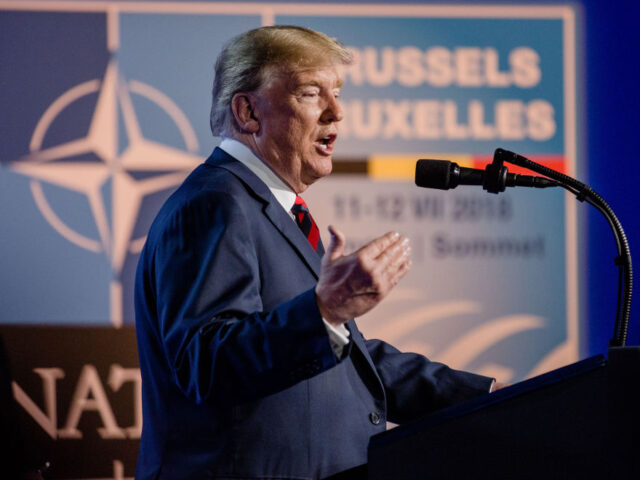Russia and China are the main “intelligence perspective” threats to the UK but President Trump could be “problematic” if he damages NATO, a former British spymaster has said.
The former head of Britain’s foreign intelligence agency the Secret Intelligence Serivce, best known as MI6, Sir Richard Dearlove told Sky News one of the “big threats” facing the UK in 2024 is President Donald Trump “changing the balance” in NATO, apparently contradicting his previous positions during the last presidency when the spymaster pushed back against claims Trump had damaged the alliance.
NATO Chief Agrees With Donald Trump, Europe Should Stump Up More Cash For Military Alliance https://t.co/KxcgHd1lAI pic.twitter.com/KgmShhaCu9
— Breitbart London (@BreitbartLondon) June 8, 2016
Dearlove, who joined MI6 in 1966 and served as codename ‘C’, the head of the agency from 1999 to 2004 spoke to Sir Trevor Philips on Sky News and was asked what “the two big threats that we ought to be paying attention to in 2024” are, and instinctively responded “Ukraine” — the Russian invasion — and China’s long term behaviour towards Taiwan. Having named the two, Sir Richard continued to elect a fourth political but not intelligence concern about the future of NATO. He said:
…I’m worried about Trump’s reelection. Which I think for the UK’s national security, is problematic because if Trump, as it were, acts hastily and damages the Atlantic alliance, that is a big deal for the UK. We’ve put all our eggs, in defense terms, in the NATO basket. If Trump really is serious about — as it were — changing the balance, I mean, the American nuclear umbrella for Europe, it is, in my view, essential to Europe’s security and defense. But that’s not an intelligence issue, it’s a political issue.
The remarks by Sir Richard are surprising, perhaps, given in the past he has been one of the few figures in the British establishment willing to push back against the once prevailing, but now widely dispelled, idea that the Trump Presidency damaged NATO. In fact, since President Trump “placed a significant emphasis on the need for increased defense spending among NATO allies”, members have upped their game and alliance spending rose year-on-year, even before the shock of the Ukraine war.
Trump Blasts Hypocritical Germany as ‘Captive of Russians’ at NATO summit https://t.co/tXeNwg8LMO
— Breitbart London (@BreitbartLondon) July 11, 2018
Dearlove gave his first broadcast interview ever to the BBC in December 2017 and refused to accept the host’s assertion that Trump had weakened the NATO alliance, and even said the Trump White House had been friendlier to Britain than the Obama administration. While saying Trump brought in an “element of unpredictability” to international affairs, Dearlove nevertheless argued, in the face of opposition from the interviewer: “what’s interesting is we’ve seen a considerable revival in NATO… [Trump did] question it, but his recent statements show actually the American commitment to NATO is not fundamentally in question.”
It is evident that Dearlove considers the British relationship with the U.S. more important than its relationship with Europe, and has said on several occasions that Brexit is an opportunity for the country to return to its more fruitful connections with Washington, rather than the only “skin-deep” ties to European states.
Whether Trump-related or not, Dearlove is not the only security thinker in Europe considering a future where the interest of United States leaders in European defence gradually wanes, refocusing on Asia. A key driver behind this change, theorises Professor Katarzyna Pisarska of the Warsaw Security Forum, is the changing demographics of the United States, which in the last century was dominated by European migrants but is less so in this century.
Professor Pisarska said last year: “For many younger Americans, including a generation of politicians, Europe is little more than an open-air museum. You feel and are actually closer to Asia and the Pacific region. China is the biggest geopolitical threat for them.
“…The USA is changing, demographically. There has been hardly any immigration from Europe for many decades, but from Asia and of course Latin America. This also changes the priorities of politics.”
Several European figures have felt the need to express their feelings on U.S. politics this week as the Iowa caucuses voted, including the EU parliament’s former Brexit coordinator Guy Verhofstadt who said this week “democracy fighting for survival”. Also speaking out was the Prime Minister of Belgium, now holding the presidency of the Council of Europe, who warned Europe would be “on its own” if Donald Trump won the 2024 election.
NATO Has Three Years to Prepare for War With Russia, Warns Poland Security Chiefhttps://t.co/3ntThlZvgd
— Breitbart London (@BreitbartLondon) December 6, 2023

COMMENTS
Please let us know if you're having issues with commenting.